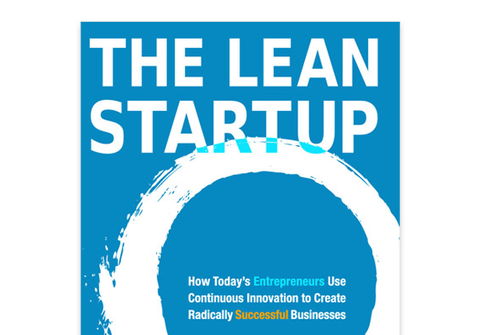Why Lean Startup sucks for startups.
Dec 12, 2013 · 11 min read · 19,872 views
If you go to Lean Startup events you will find first time founders, consultants, accelerator managers, r&d people, enterprise intrapreneurs, people of the government and a lot of people running meet-ups around the topic of Lean Startup. But you hardly meet people who are doing startups successfully or people who are in their nth startup. Why?
Also a lot of people mention more and more than Lean Startup is moving more and more to Enterprise. And that’s plain obvious to see. But why is it happening?

All of those are merely symptoms. The underlying fact for that is quite simple.
Lean Startups “sucks” for startups
Disclaimer:
I am not bashing Lean Startup in this article. I critisize it in its current iteration. Lean Startup will look different in a few years from now. And hopefully incorporate my concerns.
The problems i mention could be blamed on those who practice, or those who teach. But honestly it’s a problem with in-difference and loosing touch to startup reality.
It comes down to one thing: treating enterprise and startups the same and a cargo-cult like process by 3rd tier experts (like me) who increase the negative effects of this anti-pattern.
Many experts (incl. book authors) are giving processes and tools to enterprises and startups without truly understanding their different context and needs. And there is a reason why Lean Startup works best in enterprise and education (right now). Because that’s were those tools work best.
Let me explan…
Upside Validation vs Downside Protection
Startup life is about protecting your head and not your ass. Because your are running head-forward in the dark.
The goal of a startup is not to validate as much as possible to be sure that you are on the right track. The goal is it to validate as little as needed.
Startups are not about validating you do the right thing. Startups are about validating you are not doing the wrong thing.
It sounds very similar but it is fundamentally different.
Validating every step to get more certainty makes sense for some - eg. people who work in enterprises. But not for normal startups.
And unfortunately most people and most techniques in Lean Startup tend to ignore this different context.
Too many consultants approach this problem indifferent…
And honestly if you could measure loss of lifetime because of mediocre advice, many Lean Startup consultants would be serial killers.
Validate as little as possible
The next time someone asks you “did you validate this?” - answer “how much is it worth to validate this?”
The problem is quite simple:
- The time and effort it costs to validate something is usually higher then the pay-off
- It is usually easier to validate that you are on the wrong track. Than that you are on the right one.
- In many cases it pays off to move on if you are certain “enough”. Because most likely more (noisy) information won’t lead to more certainty.
Example

Let’s say you have the doors A B C or D to go through.
In a perfect world we could now evaluate all four doors (eg through interviews or experiments) and then try to make a educated choice. We could easily argument afterwards why we picked a decision. We did the right thing.
In theory this sounds like the right thing to do. Gather more data than you can cheaply acquire. Validate your decisions based on data.
Or we could pick the one we believe the strongest in (given the information we could timely acquire) and try to figure if it’s the wrong one.
This sounds like a suboptimal option, because maybe one of the others would have been the better option.
What i notice is that many people try to pick the first option, but end up with the same level of decision quality as in the second option, plus a bunch of fluff non actionable data, gathered by suboptimal methods that pseudo-justifies their decision.
-
In theory startups are about finding the right door.
-
In reality your own subjective bias combined with very noisy information will make it impossible to get to the information quality you hope for.
-
In reality you have huge risk associated with your cost of delay.
-
In reality you are happy if the door you will pick is not a death trap and you want to verify that.
-
In reality there is no-one questioning you apart of you - so all your steps should just happen to make sure you can convince yourself and that YOU do not lie to yourself.
If you are unsure what i mean with cost of delay or in general want to read about product management i recommend these slides by Don Reinertsen - here is a good summary
There is no point in trying to validate just to get the affirmation to move on. If you are already convinced most likely you will bias the output and waste time. No-one will ask you if you fail anyway. You want to make sure you are not doing the wrong thing and move on as fast as possible. And wait for the real risks to test.
Lean Startup calls it picking the riskiest assumption first. But leave it there. For startups “pick only the riskiest assumptions” might be a better formulation. It comes as said down to a mindset:
Good teams don’t use the tools of Lean Startup / Custdev as a navigation systems. They use it as a headlight to make sure they don’t kill anybody or get of the road.
You can easily argue that the behaviour I mention above has nothing to do with Lean Startup but the way how people apply it. Which is true.
Which leads me to the second big problem Lean Startup has…
Processes vs Principles
To explain this to people less familiar with Lean Startup. There are two approaches to Lean Startup:
- Understanding it as a strategy, so to say as a process to follow.
- Understanding it as a principle, so to say as a toolbag to use.

Similar to church members it depends to whom you speak - this definition of Lean Startup will range from that loose principles to a concrete process. And similar to lessons in the bible people tend to pick the side and lessons based on their church they belong to and the argument they are trying to win.
Btw from my talks to Eric Ries i would put him definitely into the second group. People who look for the underlying principles and evolve processes over time.
But the problem is that there is a huge cargo cult around Lean. A cargo cult of consultants and Lean Lurkers. A cargo cult that focuses on processes.
Lean Startup tends to attract people who like to be told what they should do next. And people who like to teach people that process for money. – Bjoern Lasse Herrmann, Startup Genome
People follow motions instead of understanding why they actually use certain tools.
When you don’t apply critical thought and strategy to your startup and conversations, you’re just going through the motions: replacing the hard task of strategy with the lazy solution of following someone else’s process. - Rob Fitzpatrick

Many teams become what i called above Lean Lurkers.
Teams that use complex terms and slow processes they borrow from Lean Startup to hide, and even excuse, the fact that they have no traction. No traction is no traction. No matter what you did to (not) get it.
Following Lean Startup step by step sucks for startups, but that’s ok
There is a space where you need to explain why you picked a decision. A place where you need to justify and cover your ass. A place where you want to show your updated business model canvas. A place where more data, proof and validation that fundaments your previous decision is good. The enterprise corporation.

And i mean this without any disrespect towards large corporations.
Lean Startup is one of the best things that happened to enterprises.
Because Lean Startup can help enterprises remove mid-level management decision. The moment someone outside of a project needs to touch or decide upon a project either quality or speed goes down. Lean Startup provides a framework where (in a utopian) company, opinions and politics can be reduced through data aggregation and validation to the point that they are no longer relevant.
And there is a space where you need to go through motions for no other reason than to go through the motion and be questioned at each step and learn the skills. That space is called education.
Lean Startup is a perfect vehicle for accelerators and universities to teach tools of entrepreneurship. It’s perfect to increase the contact surface with different approaches and provides an optimal framework for high paced learning experiences.
And coincidentally these are the spaces where Lean Startup currently fits perfectly.
Just to clarify:
Both problems i mentioned above - unnecessary upside validation and blindly following processes of “opinion leaders” - have per se nothing to do with Lean Startup. Lean Startup even promotes the idea of quick (potentially wrong) decisions and going for the riskiest bits first in its core.
But an undifferentiated approach to Lean Startup by treating enterprise and startup context the same leads to startup teams looking for validations only enterprises and education spaces can effort.
So if you wonder why Lean Startup moves to enterprise?
That’s the reason. In it’s current form it fits best to enterprise. It’s current leaders focus on enterprise.
The reason simple: Many people doing those workshops lost themselves in theory and forgot about the practice.
Enterprise consultants will only develop tools for enterprise people. And if you look around in the Lean Startup scene, all the current opinion leaders make their money with enterprise consulting.
Lean Startup lost a part of its core.
The problem Lean Startup has currently is (imho) that it lost the attachment to a good part of it’s core.
It used to be about the experience and best practice of startup founders. It used to be about taking that startup founder learnings and abstracting them and sharing them to more people. Founders are the ones developing new entrepreneurial tools for startup founders, not enterprise consultants. And that’s why many founders replaced their Lean Startup books with Hackernews articles.
That leaves learning opportunity for new learnings on the table. That being said - try to join the next Leancamp in your neighbourhood. We try to escape consulting land and focus on things learned by founders. Most of them come btw from other fields than lean.
What will happen with Lean Startup
I personally see two things possible to happen. Lean Startup might cut the corner and regain credibility within the startup founder scene. Which is still possible because i personally strongly believe in Eric Ries’ point of view of an evolving tool for entrepreneurship and his marketing skills to get the right people involved again.
Or not…
But even if not…
One thing I realised this year at the Lean Startup conference after speaking with Eric Ries and Ash Mauraya… It would be ok if Lean Startup doesn’t make it back to the startup scene.
Because Lean Startup itself moved on. It hit the mainstream. It became a synonym for high-paced, iterative, high-potential entrepreneurship. It became a framework for other industries to understand “how the kids in software tech do it”. It helps governments. It helps people pushing entrepreneurship.
In any case it did important big steps for entrepreneurship. And no matter if the next steps will have the same branding or another new shiny one. Lean Startup moved entrepreneurship forward.
What are your thoughts about this? Am i right? Am i wrong? Hit me up on twitter
Until then, push learning forward,
– Andreas